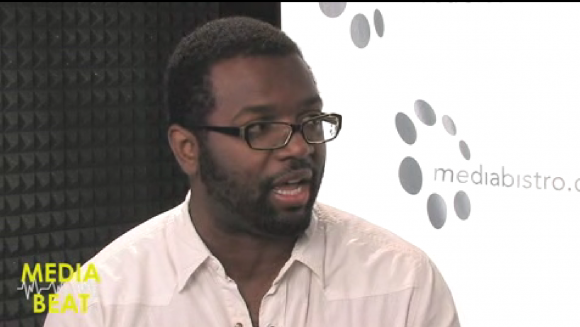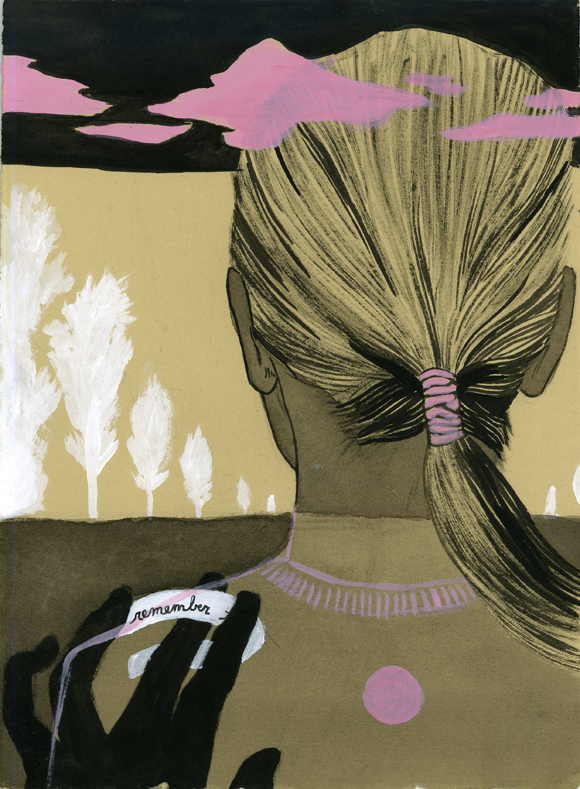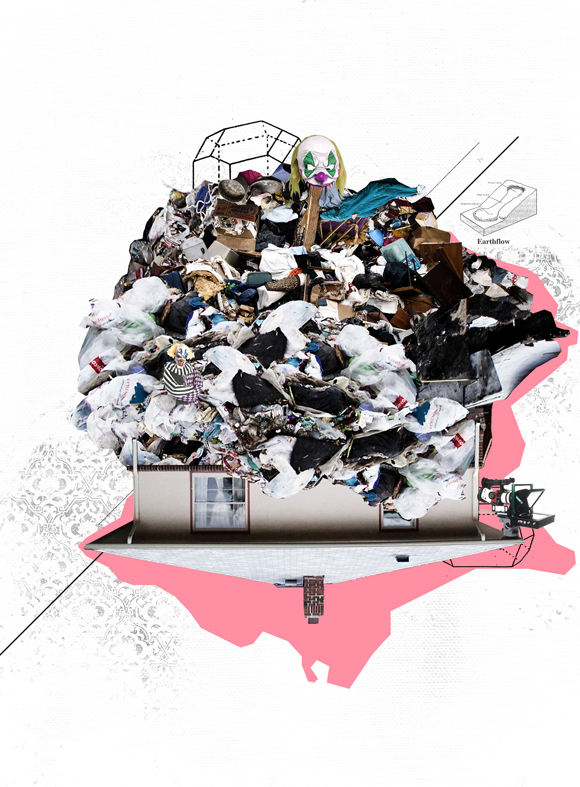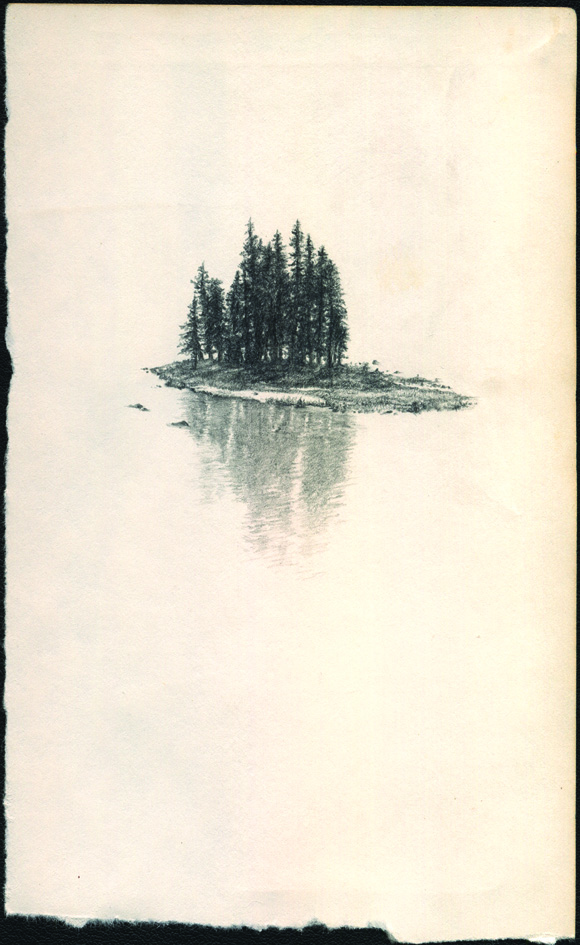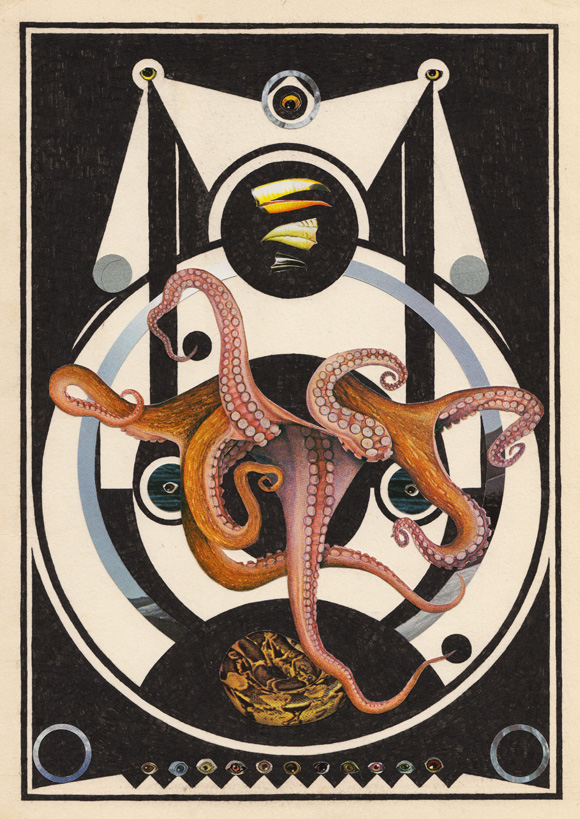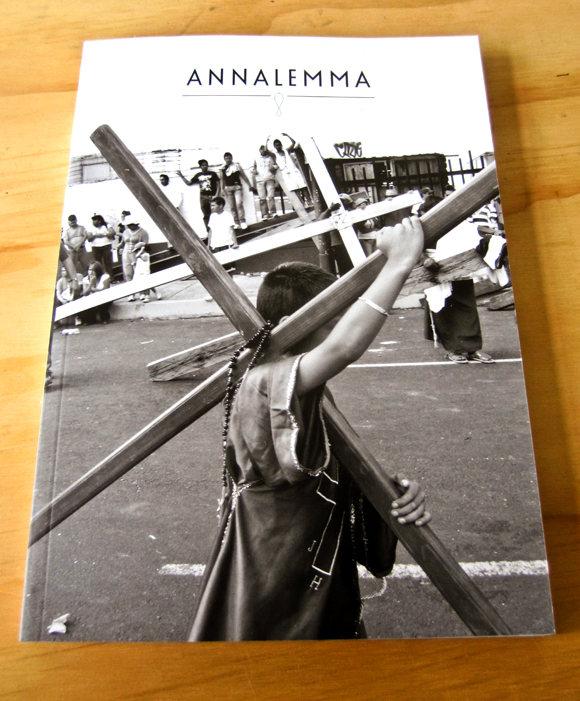Onion editor, Baratunde has a poignant point of view concerning the iPad madness. Thanks Gallycat.
Archive for the ‘words’ Category
Issue Six Preview: Bred in Captivity.
The following is an excerpt from the story Bred in Captivity by Ravi Mangla, appearing in Annalemma Issue Six: Sacrifice. Image by Xenia Fink.
There were few things Dev loved more than shooting himself in the side of the head. With his index and middle fingers aligned, his nails pressed to his greasy black hair, he would click down with his thumb on some imaginary top-access trigger. He blew his brains out countless times each day: when he was bored in school, while waiting in a long line, during any film without a high-speed car chase or kung-fu fight. He mimed the deed with such ingrained devotion that when he built his volcano for the school science fair, the activation device – affixed to twin propane tanks – fit seamlessly in the crook of his cocked hand, and as the judges made their rounds at tectonic speeds, he leaned idly over his project and scorched himself to a molten pulp.
For months my mother grieved. She wore through shrinks like the boxes of tissues we bought in bulk; their contents crushed and scattered like windblown blossoms from a dying dogwood, littering the carpet and hardwood floors. One psychologist was so forthright as to call her grief “inconsolable” and “beyond repair,” and he said it would be a waste of his time and our money to attempt to treat her. My father keyed the hood of his car.
To be honest, there were times I believed him. She cried all day and all night. In our sleep, we dreamed of mewling cats and beached whales. And then one morning I woke early to the slow gurgling of the coffee maker and found my mother in the kitchen, a cartridge belt wrung around her shoulder like John Rambo, equipped with silver canisters of cleaning products, linen dish rags, and small rolls of bubble wrap.
She waged war on danger. Mannerisms were the first to go, like the nasty habit my sister had of biting her fingernails, on the off chance poison or disease was festering underneath the nail. Little by little, her fear evolved. At her urging we began relieving ourselves in the backyard (numero dos), behind the azaleas, for fear that sewer gators might shimmy their way up the plumbing. She’d just seen a special on the sci-fi channel in which a pack of famished, sun-deprived reptiles wreaked havoc on the diarrhetic and unsuspecting denizens of New York City. That spring, our garden was the envy of all the neighbors.
Years earlier, grouped with the other parents at parties and play dates, she used to tell the story of her tipped uterus, and how she was only given a one in four shot at conception. Dev was a two-fold miracle, for surviving the nine months and for straightening out her uterus, clearing the way for me and, later, Penny. She’d always wanted a big family.
To read the rest of this story, click here to pre-order Annalemma Issue Six: Sacrfice, which ships April 12th 2010.
Ravi Mangla lives in Fairport, NY. His short fiction has appeared or will soon appear in Gargoyle, Storyglossia, Gigantic, McSweeney’s Internet Tendency, and Best of the Web 2010 (Dzanc Books). He is the Associate Series Editor for the annual Wigleaf Top 50 (Very) Short Fictions.
Xenia Fink was born 1979 in Sao Paulo. She grew up in Brazil, Mexico and Germany. After studying Illustration in Halle and Hamburg she finished her Fine Art studies with a Masters Degree at the University of Arts Berlin(UdK) in 2009. She lives and works in Berlin.
Issue Six Preview: Fight Songs.
The following is an excerpt from the story Fight Songs by Jim Ruland, appearing in Annalemma Issue Six: Sacrifice. Image by Todd Jordan.
Last week deputies from the Los Angeles County Sheriff’s Department escorted Staci Carson from the agency for violating a restraining order by stalking a lifeguard at the beach, but I’m the only one in the building who knows this. Staci had a secret blog. It isn’t up anymore–her hosting service deleted the file at the request of the authorities–but she archived the content and parked it on her hard drive, which became my hard drive after Staci left and I moved into her office. She documented her infatuation with the lifeguard in a file called “StatusReports2010” and I’ve been reading it nonstop. I’m pretty much in love with Staci Carson now.
I didn’t know Staci Carson very well. She traveled all the time and worked from home a lot. She was reasonably fit, reasonably personable, reasonably attractive. In short, the least likely person to get all fatal attraction over a nineteen-year-old lifeguard barely out of high school. Not that I’m judging her. I believe love is a weed that can spring up anywhere. You can rip it out of the ground, but its root structure, its essence, remains. You can’t make love go away just because you want it to.
The telephone rings and I nearly jump out of my chair. It’s my first call in my new office and the ring tone is super loud.
“Hey, sugar.”
It’s the receptionist, a woman named Gilda who wears wild wigs and headscarves, and may very well be the only person in the agency with a sense of humor, which is a problem since our biggest client is a comedy network.
“You got a call from Jessica.”
“Jessica?” Jessie is the daughter of my on-and-off girlfriend, Rocio. I have no idea why Jessie would be calling me at work.
“I’ll put her through.”
“Wait,” I say, but it’s too late. Gilda’s gone. I use my best I’m-super-busy-this-better-be-good voice: “Tom Lanier.”
“Hi, Tom.”
“Jessie. Is everything all right?”
“Yeah. Well. Sorta.”
“What does ‘sorta’ mean?”
“I got suspended.”
“What did you do?”
“Nothing!”
“You got suspended for doing nothing?” I wince as the words tumble out of my mouth. To a fourteen-year-old, sarcasm is pretty much the same thing as being a dick.
“Hold on,” she says and another voice comes over the line. Someone from the school.
“Mr. Vargas?”
“Um, no. This is Jessie’s mother’s significant other.” It’s the first time I’ve ever used this phrase to describe myself and it feels completely asinine, but Jessie’s mother’s boyfriend sounds sleazy. It could be that I’m slightly intimidated: this woman’s got the I’m-super-busy-this-better-be-good voice down cold.
“I see. And your name is?”
“Lanier. Tom Lanier.”
“Mr. Lanier, this is Ms. Ortega, the school disciplinarian at Our Lady of Guadalupe. Your significant other’s daughter has been suspended for a dress code violation. Will you be coming to pick her up or shall I phone her mother?”
“I’ll be right there,” I say. “What’s your address?”
“You can obtain the school’s address and driving directions on our website.”
“You can’t just give it me?”
“No, I can’t just give it to you. Good day, Mr. Lanier.”
I put down the phone and grab my car keys. Love without sacrifice is but a declaration of intentions. That’s from Staci’s blog, posted a week before she was arrested. I don’t what this means, but I can feel the truth of it down to my bones.
To read the rest of this story click here to pre-order Annalemma Issue Six: Sacrifice, which ships April 12th.
Jim Ruland is the author of the short story collection Big Lonesome and the organizer of the L.A.-based reading series Vermin on the Mount. He lives in San Diego with his wife the visual artist Nuvia Crisol Guerra.
Todd Jordan is a photographer based in New York City. He has had various solo exhibitions of his work and been included in several group shows. He has self published two books of his work and most recently released “Sleep Talking” with Decathlon Books. Todd is represented in New York by Peter Hay Halpert Fine Art.
Issue Six Preview: A Flawless Pick.
The following is an excerpt from the story A Flawless Pick by Ian Bassingthwaighte, appearing in Annlemma Issue Six. Image by Anthony Cudahy.
I gave our boy a photograph of his mother and I the day we met his doctor. In it, we look disheveled, as if we’d recently been laid, been robbed, taken drugs, or regressed into stupidity. It really is a splendid photograph, from an artistic point view.
His doctor said I should bring the boy a picture of something he might be inclined to remember. He said it should be original, memorable. Has he seen before? Yes, he took it. Would it be an image he might remember? If there were an image in the world he’d remember, it’d be this one. Might it conjure an emotion? Yes, yes, yes—of course. Whimsy. It would conjure whimsy. Is that an emotion?
His doctor says the best way to track down a memory is by recalling an emotion and chasing it back to where it came from. I’d hoped the photo would have brought him here: it was a cold night on a rock beach in Oregon. Our son, behind the camera, shouted, “Be ugly.” We laughed and we tried as best as we could to oblige: Laura tussled my hair and I tussled hers, I pulled off my shirt and she took it and wore it over her wind-breaker, and we both made an equally disturbing face, halfway between orgasm and hemorrhoid. He took the photograph. It was a Polaroid and so he stood for a moment shaking it, waiting for the image to appear. When it did, he began to chuckle. He looked at us and said with a smile, “You guys are disgusting. If I ever look like that, please just clobber me with a hammer and get it over with.” He must have been fifteen.
But when I gave the picture to our son, his face was blank. I wasn’t exactly expecting an immediate recognition, but I was quietly hoping for one.
But hope is a funny contradiction. It has a way of always letting you down.
To read the rest of the story click here to pre-order Annalemma Issue Six: Sacrifice, which ships April 12th.
Ian Bassingthwaighte lives and writes and drinks and dances and meanders aimlessly in and around Cairo, Egypt. He has become permanently sunburned in his time there. His favorite food is Cheerios and he is afraid of only three things: death, swimming in very deep water, and ostriches.
Anthony Cudahy is a twenty-year-old illustration student in Brooklyn, New York. He is from the South and doesn’t appreciate this winter.
Issue Six Preview: A Very Compassionate Baby.
The following is an excerpt from the story A Very Compassionate Baby by Anne Valente, appearing in Annalemma Issue Six. Image by Chrissy Lau.
Gerard finds that he cannot take his baby anywhere. Once, when they walked into the Dairy Queen on McPherson, a teenager passed them on the way out and dropped his strawberry ice cream cone on the pavement. The baby watched the pink scoop fall woefully to the ground, then exploded into such unmanageable tears that Gerard and his wife simply brought him back to the car. Another time, when they took the baby to the park on a sun-filled spring day, the park crew was out mowing the grounds, and the baby leaned out his stroller and saw the grass flying, weeds razed, dandelion spores floating up and away on currents of violent air, and he cried with such heavy sorrow that the sun couldn’t cheer him, nor the baby ducks swimming through the pond, nor the tulips blooming in the fields. They turned the stroller around and took him home.
And now, Gerard knows it for sure – that to take the baby anywhere is to risk perils like this, the startling onset of tears without warning, howls like sirens that alert everyone around them that something is terribly, terribly wrong.
When he takes the baby for a physical – after other similar incidents involving smashed ants, a broken jar of pickles, and a stuffed penguin, lost under the baby’s crib for two days – he thinks to ask the pediatrician about the baby’s behavior, in a way that won’t sound strange.
“Dr. Mullens?”
She’s turned away from him, weighing the baby on the child scale, but when he asks she turns and looks at him, her face as blank as paper. The baby punches the air behind her, his tiny fists like clementines.
“What does it mean? If your baby cries a lot?”
She looks back at the baby, smiling and grabbing his feet.
“He doesn’t seem overly tearful.”
“Well, he isn’t now. But I bet if you dropped something, like your stethoscope, he’d start crying. Probably immediately.”
Dr. Mullens’ forehead creases. “You mean he’s sensitive to loud sound?”
“No. No, that’s not what I mean.”
“Then what do you mean, Mr. Davenport?”
“I mean he cries, all the time, when anything happens that seems remotely sad.”
“Babies mimic sometimes. Is that what you mean?”
Gerard sighs, looks around the room. He searches for anything, as demonstration, as way to show the pediatrician what he means. Finally he sees it, the wall of pamphlets, take-home brochures with titles like Healthy Child Development and Could Your Baby Have Hearing Loss? He takes one from the shelf, a leaflet about breastfeeding, with a woman cradling a child drawn across the front, and he waves it before the baby so he will look. Once he does, Gerard tears the pamphlet in half.
The baby stares, eyes round as plates. Then he bursts swiftly into tears, great heaving sobs, the halves of the leaflet limp in Gerard’s hands.
Gerard looks at Dr. Mullens, who looks back at him and smiles.
“Well, Mr. Davenport,” she says, rubbing the baby’s belly, until his choking cries slowly disintegrate into sniffles, “it looks like you have a very compassionate baby on your hands.”
She laughs, she picks the baby up, she puts him back on the examination table where he lies like a sack of potatoes, sniffles receding to sighs. Gerard looks on, feeling the awkwardness of dismissal, and wondering why, why in this room of all places, why is this funny, why would this ever be funny at all.
To read the rest of this story click here to purchase Issue Six, which ships April 12th.
Anne Valente’s work appears or is forthcoming in Keyhole, Monkeybicycle, Knee-Jerk, JMWW and Necessary Fiction, among others. Her stories have been nominated for a 2009 Pushcart Prize and the 2010 AWP Intro Journals Award. She is the assistant editor of Storyglossia and lives in Ohio.
Chrissy Lau is originally from England but now lives in Sydney, Australia. She absolutely loves to draw quirky, endearing and intriguing things with lots of lines and patterns.
Issue Six Preview: Baron von Richtofen Flies Again.
The following is an excerpt from the story Baron von Richtofen Flies Again by Ryan Call, appearing in Annalemma Issue Six. Image by Jenny Kendler.
The first two deaths, a pair of gerbils on loan from the school, had sent his children into outrageous fits of mourning. They wandered around the house that weekend, eyes bloodshot and noses runny from weeping, and bumped into walls, collapsed facedown on the couch, across chairs, flailed their limbs, refused to eat their dinners, whimpered in bed at night. His wife suggested he try to distract them with some fun activity, like maybe an arts and crafts project? So Gary led them in cutting armbands out of a pair of old, black athletic tube socks he found at the bottom of his underwear drawer, and these the children delighted in wearing to school the following week.
During the parent teacher conference, he offered to purchase a new set of gerbils. Maybe there existed a hardier breed, one better suited to the repeated, but no less affectionate attention of young children in the process of developing the finer action of their motor skills?
I’m afraid the issue is not one of money, but of morale, his children’s teacher said.
The entire first grade, all three homerooms, had apparently taken to wearing some form of black armband, and would he know anything about that?
Perhaps a pair of guinea pigs then, he said.
To continue the story, click here to pre-order Annalemma Issue Six, which ships April 12th, 2010.
Ryan Call‘s stories appear or are forthcoming in Hobart, Caketrain, Mid-American Review, Lo-Ball, New York Tyrant, and elsewhere. He and his wife live in Houston.
Jenny Kendler was born in 1980 in New York City. She graduated summa cum laude with a BFA from the Maryland Institute College of Art in 2002, and received her MFA from the School of the Art Institute of Chicago in 2006. She currently lives and works in Chicago.
Issue Six Preview: Goodnight, America.
The following is an excerpt from the story Goodnight, America by Jack Boettcher, appearing in Annalemma Issue Six. Image by Daniel Lucas.
“Carol, word this evening that a bridge has collapsed over the Coosa River. There were several injuries, but only one person died.”
“Dan, bless those poor onlookers. Can you imagine?”
“I see the bridge crumbling into the river like a shelf of shale touched by our Lord’s pointer itself, Carol.”
“It’s just awful isn’t it.”
“Carol. Like, no, I can’t even begin to. Uh. Us boys used to jump off that bridge into the river at night, wearing nothing but the suits we wore to the interview with God before we were born, so obviously I have some very tender like feelings for that bridge, but we have to press on, we have to fight, we have wars going on right now. Which reminds me, folks, you can donate cigarettes and old battery-operated handheld video games for the troops to our offices, at any time you wish, call…”
*
You think about letting go and floating out on the invisible wires of a wind shifting direction, on summer nights with the river drawing up fast beneath you. But with the air so humid that it was like you were already falling through something like water, and until you hit the quick black surface and went swift and away you never knew what the water really was. And you get distracted before the bright lights and the camera, you have to read the cards twice, and then you read things that aren’t on the cards at all, textual gaps and illusions into which you stumble. From that warm and rust-rough footing your tiny toes gripped, you could smell the blasts off the steel furnaces and see the deer sleeping on the banks below, color of simply smoke, not yet skittish because the first boy hadn’t jumped and cracked the hushed rush of the current. You honestly believe the world had the exact number of people it was supposed to have back then, as your mother also professes. Whichever path you took from home, in any direction, the wilderness always clung as snug against you. Now there are paved roads and sodium lights for the teenagers to find their ways home. You were drunk on that bridge above the river and you were so young and drunk that the stars prickled through the brine into your pores and stung like the horseflies that were actually stinging you. You flailed above the water like some hapless new mammal with pawn shop wings and all those comets reached across the sky to bite you in the ass. You swatted away horseflies midair. A wonder you never cracked your skull: people scavenged metal and trash from that river for a living.
Click here to pre-order Annalemma Issue Six, which ships April 12th, 2010.
Jack Boettcher is the author of two chapbooks of poetry, most recently The Deviants (Greying Ghost Press 2009). His stories and poems have appeared or are forthcoming in Boston Review, Denver Quarterly, Fence, Indiana Review, Pleiades, and other magazines. He lives in Austin, TX.
Daniel Lucas is an artist & graphic designer working and living in luscious Los Angeles. A graduate from the CalArts program, he – like so many other graduates – still has little, to no, idea where he is going in life. This is the most exciting thing about it all to him.
Corium Magazine.
Contributor Lauren Becker, along with notable writers Greg Gerke and Heather Fowler, recently unveiled Corium Magazine, a new online journal with a simple design and some damn fine writers published in their first issue.
I’ve only read Sean Lovelace’s Bonnie and Clyde piece so far, an inspiring take on the genre of historical fiction. Looking forward to reading Stephen Elliott and Alec Neidenthal’s piece soon.
Bookmark Corium today. There’s sure to be some quality stories coming from them in the near future.
Well done, Lauren, Greg and Heather. Welcome to the fold.
Issue Six Preview: Ashore, an Island.
The following is an excerpt from the story Ashore, an Island, by Jonathan Messinger, appearing in Annalemma Issue Six. Image by Ghazal Hashemi.
My mother didn’t understand that Dominica was a different island than the Dominican Republic, so in the months leading up to the belated honeymoon she would say, “Kyle is finally going on his honeymoon,” she’d say, “to the Dominican Republic.”
And you would think it would be that finally, the inherent judgment of adverbs, that would have driven my brother crazy. But because my mother had entered this age of enlightenment, we all knew the finally came more from relief for her hard-working son than it did from admonishment.
Instead, it was her persistent confusion of the French Dominica with the Spanish Dominican Republic that made of my brother a red-eyed maniac.
“It’s Dominica, ma!” he’d yell.
“That’s what I said,” she’d calmly respond.
“It’s different. It’s not the Dominican Republic. It’s a totally different island.”
“Well, I don’t know, I don’t know,” she’d sing-song, not wanting a fight.
It progressed past the point of civility, to where my brother and mother no longer spoke to each other. And suddenly there was a need for me, the little brother without a wife, without a steady job and without the ambition to find one. Suddenly the family warmed to me, which was a new sensation. While my family froze each other in the chambers of their bruised love, I was treated like a freshly delivered pizza, or, whatever makes families happy these days.
I have to confess, I didn’t know why my brother lost his cool over my mother’s confusion. She’d always had weird language hiccups, and yes they could be frustrating, but they’d always been something of a joke for our family, the way families laugh at our balding fathers or our nephews with heads shaped like vegetables. Kyle never lost his cool when my mother consistently called a piña colada a pina calooda or the famous comedian Jerry Seinfeld Jerry Steinfield.
Click here to pre-order your copy of Annalemma Issue Six, which ships April 12th.
Jonathan Messinger is co-publisher of featherproof books, books editor of Time Out Chicago, and co-founder of The Dollar Store reading series. He’s the author of the story collection Hiding Out, and is at work on the next in the series: Hiding Out 2: Hiding In and Hiding Out 3: Don’t Stop Hiding.
Ghazal Hashemi is an artist and writer born in Tehran, Iran. She is currently living in a beach town the size of a shoe box.
Issue Six Preview: Three Cataclysm Babies.
The following is an excerpt from the story Three Cataclysm Babies by Matt Bell, appearing in Annalemma Issue Six. Image by Joseph Wood.
Oneida, Ophelia, Ornella
My siren-daughters, my sweet-singing beauties: Whose songs pierce even the thickest of our soundproofed buildings, even the home that once they lived inside, when they were still part of my fractured family, still children under my care. Who, long before the floods began, once lined up beside their mother upon her piano bench, each daughter differing only in age and size, otherwise blessed with the same white-blonde hair, the same eyes so green they glittered even after the lamp-light was extinguished each night.
While their mother pressed each key in turn, these three daughters of mine hummed along, matching their voices to the piano’s percussion, to the tones that escaped its own upright body. One by one they captured its voice, contained it in their chests, so that soon we heard the piano even when no one was playing, its notes coming from our white-fenced yard, from their playroom, from the tight porcelain confines of their shared bath times.
It wasn’t until after the rains started that the oldest learned to make and mimic her mother’s mouth-noises, and so it was she who first licked her lips at the dinner table and then repeated every sonorous syllable of my wife’s long speech, the description of her day at the dykes, building dams with all the other mothers recently pressed into service, no longer allowed to stay home with their children. Soon the younger two could do as well as the oldest, all of them speaking in the mother’s many voices, matching the correct pitch and timbre that accompanied each shift of mood and mannerism.
How soon after did they learn to throw their own voices, to call out from places they could not possibly be? When did I first hear my wife’s words from every room, calling me to dinner, calling me to work, calling me to bed to make another daughter, so that the song might go on, might grow even fuller?
Click here to pre-order Issue Six, which ships April 12th.
Matt Bell is the author of How They Were Found, forthcoming from Keyhole Press in October 2010. His fiction appears in literary magazines such as Conjunctions, Hayden’s Ferry Review, Unsaid, and American Short Fiction, and has been selected for inclusion in Best American Mystery Stories 2010. He is the editor of The Collagist and can be found online at www.mdbell.com.
Joseph Wood has recently graduated from the University of Brighton and is currently practicing in London as freelance illustrator and creative image maker.












